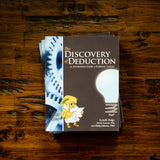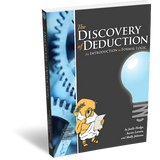- Description
- Specifications
- Contributors
- Support
- Testimonials
-
The Discovery of Deduction: An Introduction to Formal Logic will welcome your students into the fascinating realm of formal, deductive logic. This text teaches students how an argument is put together—the form or structure of an argument. It pulls back the curtain to show students not only how arguments work, but also how to assess what’s going on in their own minds. The Discovery of Deduction is recommended for students who have studied informal fallacies, such as those taught in The Art of Argument: An Introduction to the Informal Fallacies; however, the text does also stand on its own as an independent study of formal logic.
The Discovery of Deduction (Student Edition) makes a subject usually reserved for study in college accessible and relevant to logic-stage students, who are at an age when they are beginning to engage with important ideas. This text emphasizes the practical and real-world application of soundly structured deductive logic. Using methods such as Socratic dialogue, ample discussion, and integration of other subjects, the text approaches formal logic in the ideal way for dialectic students. Starting with a short history of Aristotelian logic, students move from there to learning how to translate arguments from ordinary, conversational, or written narratives into categorical form. Students then build on those skills as they study how to construct syllogisms and test them for validity. As a part of this process, they study the square of opposition and relationships of equivalence, learning how to make valid propositional inferences and analyze syllogisms.
This is a consumable item. For more information on this product's copyright, please refer to our General FAQ section here.
Paperback
ISBN: 9781600510335
Pages: 332
Dimensions: 8.5in x 11in
-
Shelly Johnson, Author

Shelly Johnson, PhD, earned her doctorate in philosophy at the University of Kentucky with a specialty in social and political philosophy. She teaches logic and introductory philosophy courses at the University of Kentucky. Before returning to graduate school, Shelly taught middle and high school for sixteen years, twelve of which were in a classical school in Lexington, Kentucky. She originally earned a degree in secondary English education from Malone University before pursuing an MEd from Covenant College and a masters in philosophy from the University of Kentucky. She is also the author of Everyday Debate & Discussion: A Guide to Socratic Conversation, Informal Discussion, and Formal Debate and coauthor of The Discovery of Deduction: An Introduction to Formal Logic.Shelly lives in Lexington with her husband, John, and her cat, Jax, and enjoys reading, writing, juggling, hula-hooping, and watching movies. She teaches Persuasive Writing: The Argument Builder and Everyday Debate at Scholé Academy.
Aaron G. Larsen DA, Author

Aaron Larsen currently teaches history, Latin, logic, and rhetoric at Regents School of Charlottesville in Virginia. He previously taught at 2 classical schools in Pennsylvania. In 2001, Dr. Larsen joined a team led by Dr. Christopher Perrin and 2 other colleagues to help form Classical Academic Press. The motivation behind this endeavor was to produce exceptional Latin and logic curricula for the classical education movement. The first results of this collaboration included the publication of their logic text, The Art of Argument, and the 3-volume Latin for Children series. Aaron is also a coauthor of The Discovery of Deduction: An Introduction to Formal Logic and The Curious Historian series.
Aaron received his BA in history, with minors in philosophy and education, from Covenant College in Georgia. He completed his coursework for his DA in modern world history from St. John's University in New York and went on to write his doctoral thesis on the Meiji Restoration, which, as he likes to say, is "the most important event in world history that nobody's ever heard of."
Joelle Hodge, Author

Joelle Hodge holds a BA in history/political science from Messiah College in Grantham, Pennsylvania, and is currently enrolled in the Master of Arts in Teaching program at Eastern University’s Templeton Honors College. She began her career as a staffer to United States Senator Arlen Specter (R-Pa) before finding her professional home in the world of classical education in 1999. She has twenty years of teaching experience—several of which were spent at a classical school in Harrisburg, Pennsylvania. There she also developed much of their logic and rhetoric curricula. She has coauthored two logic books, The Art of Argument: An Introduction to the Informal Fallacies and The Discovery of Deduction: An Introduction to Formal Logic, both published by Classical Academic Press (CAP), and continues to support various editorial projects at CAP, but her primary focus is on the growth and development of Scholé Academy, where she serves as the principal. Since the inception of Scholé Academy in 2014, Joelle has taught courses across a variety of disciplines, including math, logic, and rhetoric, as well as a course in student-skills development (How to Be a Student). She served as senior teacher for Scholé Academy before stepping into the role of academy principal in 2018. Additionally, Classical Academic Press hosts Joelle’s consultant offerings, where she engages with educators across the country, tailoring workshops for classical schools and co-ops that seek to train their teachers in the fundamentals of dialectic- and rhetoric-stage pedagogy.








